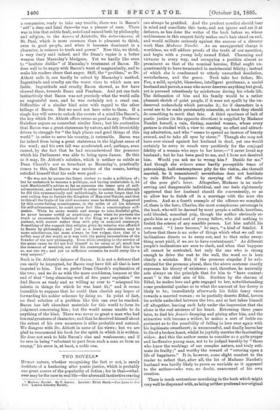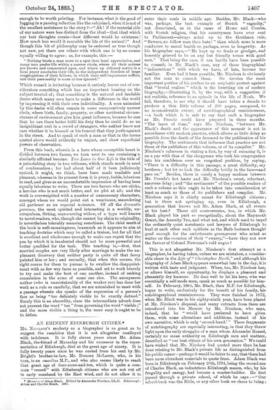TWO NOVELS.* Huateac nature, whether recognising the feet or not,
is rarely destitute of a hankering after poetic justice, which is probably one great source of the popularity of fiction ; for in that—what- ever may be the case in real life—the aforesaid instinctive craving
• Madame Naudet. By P. Lerrac. London: Elliot 8k:el.—Two Loves in One Life. London Literary 'Society. can always be gratified. And the prudent novelist should bear in mind and conciliate this taste, and not ignore and set it at defiance, as has done the writer of the book before us, whose recklessness in this respect fairly makes one's hair stand on end, and would militate seriously against the success of a cleverer work than Madame nuclei. As an unsupported charge is worthless, we will adduce proofs of the truth of our assertion, and begin with a young lady named Ethel. Charming and virtuous in every way, and occupying a position almost as prominent as that of the nominal heroine, Ethel ought un- questionably to have terminated in matrimonial felicity; instead of which she is condemned to utterly unmerited desolation, wretchedness, and the grave. Next take her father, Mr. Fox, a mild, upright, blameless, intelligent gentleman, a model husband and parent, a man who never deserves anything but good, yet is pursued relentlessly by misfortune during his whole life. The delineation of him and his family would be a rather pleasant sketch of quiet people, if it were not spoilt by the un- deserved melancholy which pervades it; for if characters in a novel are to be made persistently miserable, at least they should do something to merit that fate. A third specimen of lack of poetic justice (in the opposite direction) is supplied by Madame Nandet herself, a vain, flirting, married woman, whose every gesture is studied with a view to creating an effect and attract- ing admiration, and who "seems to spread an incense of beauty around, and to take all eyes by storm." Though she may not have ever sinned against her husband in deed, yet one would certainly be sorry to vouch very positively for the conjugal fidelity of a woman who says to her lover,—" I never loved my husband ; but he has been good to me, and I have not deceived him. Would you ask me to wrong him P Decide for me." And though she evinces some hardly perceptible trace of patronising, half-contemptuous pity for the victim, she (herself married, be it remembered) nevertheless does not hestitate to ruin Ethel's happiness by carrying off the affections of the poor girl's lover. Altogether, Madame is an unde- serving and disagreeable individual, and one feels righteously aggrieved that her husband should die conveniently, so as to allow her to finish off in a marriage with the man she prefers. And as a fourth example of the offence 'we complain of, there is the hero, Charles, the most conspicuous personage in the book, who will be deemed by most people a selfish, heartless, cold-blooded, conceited prig, though the anther obviously re- gards him as a good sort of young fellow, who did nothing to forfeit the,esteem of any sensible person. Let him unfold his own creed. "I have become," he says, "a kind of fatalist. I believe that there is an order of things which what -we call our inclinations directs us to carry out, and to that order every- thing must yield, if we are to have contentment." As different people's inclinations are sure to clash, and when that happens all cannot be contented, but only the one who is strong enough to drive the rest to the wall, the word we is here clearly a mistake. Bat if the pronoun singular I be sub- stituted for the pronoun plural, then the above sentence exactly expresses his theory of existence ; and, therefore, he naturally acts always on the principle that for him to " have content- ment " is the chief aim of life. Smitten by the charms of Ethel, he makes love and gets engaged to her, notwithstanding some prudential qualms as to what the amount of her dowry is likely to be ; immediately afterwards his fickle fancy veers towards a married woman ; so he partially deserts Ethel, hovers for awhile undecided between the two, and at last takes himself off altogether, leaving each lady under the impression that she alone is the real mistress of his heart. Returning three years later, to find his fiancee drooping and pining after him, and the attractive wife become a widow, he makes a sort of feeble ex- periment as to the possibility of falling in love over again with his legitimate sweetheart; is unsuccessful, and finally leaves her to die of a broken heart, whilst he joyfully marries the fascinating widow. And this the author seems to consider as a quite proper and inoffensive young man, not to be judged harshly by "those who know the workings of our complex nature, and truly esti- mate its frailty ;" and worthy the reward of "entering upon a life of happiness." It is, however, some alight comfort to the reader to reflect that, after all, the lot of Madame Nandet's husband was hardly likely to prove so enviable as it appeared to the author—who was, no doubt, enamoured of his own creation.
There is mach sententious moralising in the book which might very well be dispensed with, as being neither profound nor original
enough to be worth printing. For instance, what is the good of lugging in a passing reflection like the subjoined, when it is not of the smallest assistance to the story ?—" Ah ! if the material side of our nature were less distinct from the ideal—that ideal which our best thoughts create—how different would be existence ! How much less would it resemble the life of the animal !" And though this hit of philosophy may be endorsed as true though not new, yet there are others with which one is by no means equally willing to agree ; as, for example, this :—
" Nothing binds a man more to a spot then local appreciation, and many men prefer life within a narrow circle, where all their actions are known and commented upon, and where an obituary notice in a local paper concludes their life, to the independent freedom of large congregations of their fellows, in which their self-importance suffers, and their personality is more or less ignored."
Which remark is irritating because it entirely leaves out of con- sideration something which has an important bearing on the subject treated of ; that something is the natural and laudable desire which many men have to make a difference in the world by impressing it with their own individuality. A. man animated by this desire will often remain in some comparatively narrow circle, where birth, family, property, or other accidental circam- stances of environment give him great influence, because he sees that he can there better fulfil his duty than he could do as an insignificant unit in a crowd of strangers, who neither know nor care whether it be himself or his funeral that they jostle against in the street. And to speak of such a man as that in the terms quoted above would evidently be unjust, and show superficial powers of observation.
From this book, wherein is a hero whose susceptible heart is divided between two flames, we turn next to one containing a, similarly afflicted heroine. Two Loves in. One Life is the title of a painstaking story in two vdiumes, which stands much in need of condensation ; for had about half of it been judiciously excised, it might, we think, have been made readable and pleasant, whereas in its present form it is prosy, feeble, laborious to read, and gives as an uncomfortable impression of having been equally laborious to write. There are two heroes who are sticks, a heroine who is not much better, and no plot at all; and the work is overweighted with a number of unnecessary characters, amongst whom we would point out a wearisome, maundering old gardener as an especial nuisance. Of all the dramatis personce, the most spirited and interesting is a worldly, un- scrupulous, flirting, manceusring widow, of a type well known to novel-readers, who, though she cannot lay claim to originality, is nevertheless tolerably amusing sometimes. The chief merit of the book is weR-meaningness, inasmuch as it appears to aim at teaching doctrine which may be called a truism, but for all that is excellent and wholesome enough to make one regret that the pen by which it is inculcated should not be more powerful and better qualified for the task. This teaching is,—first, that married couples are very likely after marriage to make the un- pleasant discovery that neither party is quite all that fancy painted him or her ; and secondly, that when this occurs, the right course for them to pursue is to swallow the disappoint- ment with as few wry faces as possible, and set to work bravely to try and make the best of one another, instead of seeking consolation in the arms of some one else. The anonymous author (who is unmistakeably of the weaker sex) has done her work as a rule so carefully, that we are astonished to meet with a passage wherein she speaks of the expression of a person's face as being "too delicately visible to be exactly defined." Surely this is an absurdity, since the intermediate adverb does not prevent the word "too "from governing the word " visible ;" and the more visible a thing is, the more easy it ought to be to define.



































 Previous page
Previous page